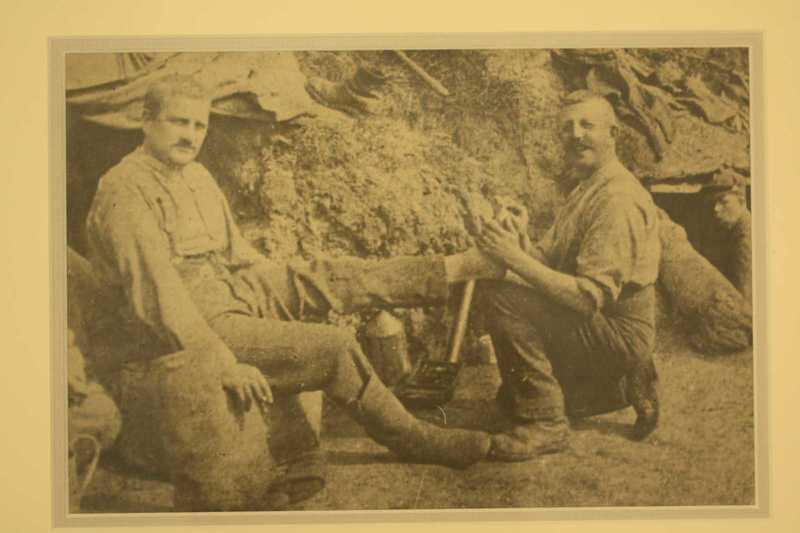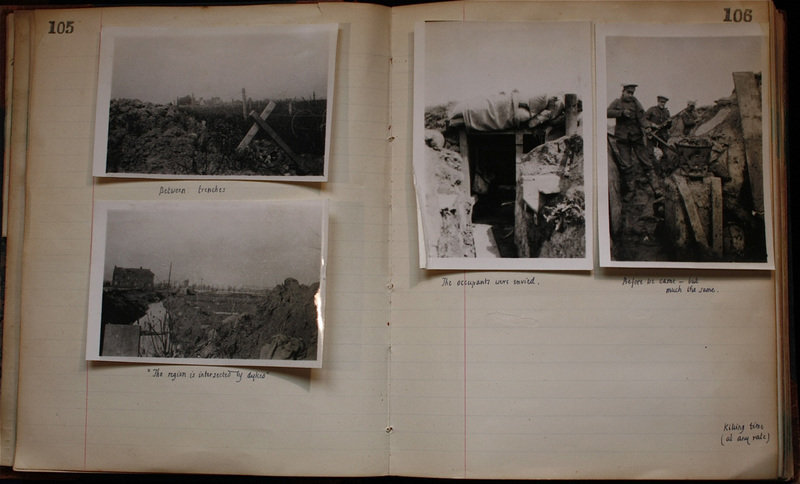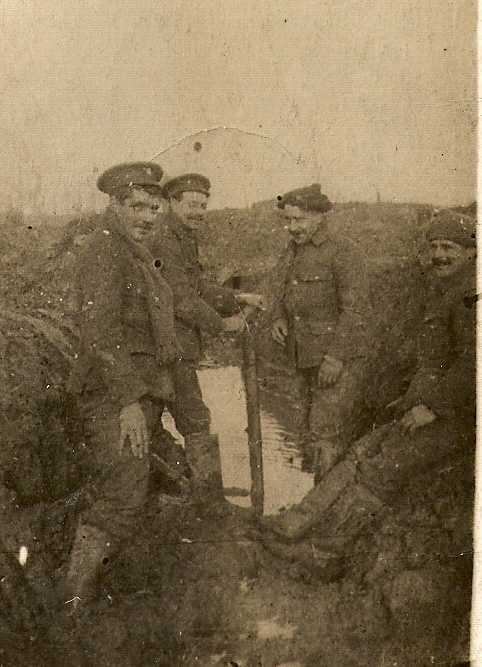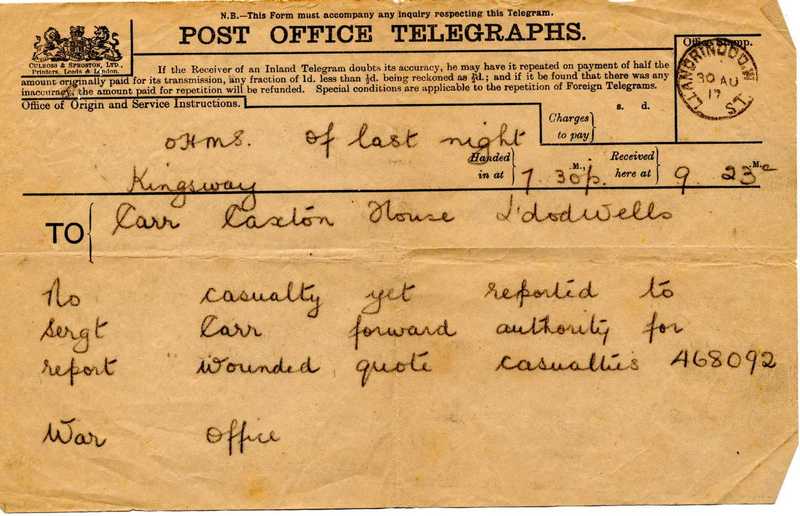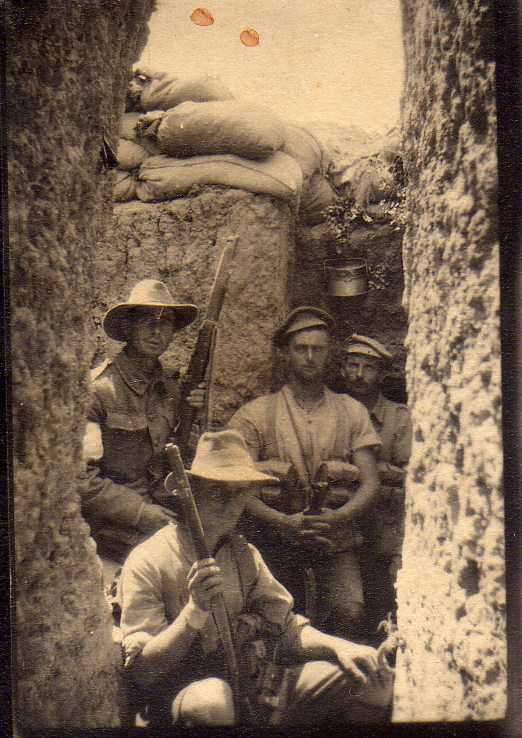Trench Warfare
Trench Warfare
This section gives some very basic information about World War I with emphasis on the perspectives shared throughout British society.
A chiropodist in the trenches
Trenches, Dykes and Soldiers: From Edmund Blunden's Minute Book.
Ernest Frederick Sewell in the trenches
Trench Warfare
The images of trench warfare experienced by the soldiers on all fronts during World War I has left an indelible impression on the minds of people throughout the century; and the tactical stalemate that evolved from this defensive policy has influenced military strategists ever since. The trenches on the Western Front extended from the North Sea right down to the Swiss border and apart from the dramatic gains by both the Germans and Allies throughout 1918 neither side advanced more than a few miles during the course of the war. The front-line for each army was a series of communication trenches, support trenches, advanced trenches and observation posts. Between the two forward trenches lay the deserted No-Man's Land which could be as wide as half a mile, or at some points only twenty or thirty yards. Conditions, naturally, were appalling for the troops at the front. In the winter snow and ice froze the ground whilst in the spring and autumn the rain turned the area into a vast sea of mud. Summer brought other discomforts such as the rats, flies, lice, and the inevitable diseases. In addition to all of these the soldiers faced the continual danger of artillery shells, snipers, trench-raids, and the inevitable going 'over the top' (i.e. scaling the trench ladders and attacking the opposing trench across No-Man's Land).
Rosenberg sometimes briefly mentioned the experience of the trenches in his letters back home although the majority of the time was spent pursuing his career and imminent publications. In June 1916 he wrote to Miss Seaton noting:
We made straight for the trenches, but we've had vile weather, and I've been wet through for four days and nights. I lost all my socks and things before I left England, and hadn't the chance to make it up again, so I've been in trouble, particularly with bad heels; you can't have the slightest conception of what such an apparently trivial thing means. We've had shells bursting two yards off, bullets whizzing all over the show, but all you are aware of is the agony of your heels...
However, his greatest means of expressing the horror and despair of the trenches was in his poems, such as 'Break of Day in the Trenches', the almost hellish images of 'Dead Man's Dump', or the comical 'Louse Hunting', and The Immortals'. Wilfred Owen also portrayed fine images of the life of the soldier and the bitter experiences of trench warfare in such contrasting poems as the bitterly ironic 'Inspection' or the savage tour de force of 'Exposure'. Finally, there is the almost story-like quality of Nichol's 'Comrades: An Episode' which captures the suspense and tension of life on the front.
Telegrams and official letters re. Charles W. Carr - missing presumed dead during the Battle of Paschendale
Photograph of Australian soldiers in the trenches at Gallipoli, belonging to Joseph Thompson
Casualties
Although records and estimates vary on the figures of total dead and wounded during the First World War it is still obvious that the figures were on a scale never envisaged by any military strategists. In his History of the First World War A. J. P. Taylor gives the following figures (loss of life):
| USA | 114,095 |
| British Empire | 251,900 |
| Turkey | 375,000 |
| Italy | 460,000 |
| Great Britain | 761,213 |
| Austria-Hungary | 1,100,000 |
| France | 1,358,000 |
| Russia | 1,700,000 |
| Germany | 2,000,000 |
| Total Military Loss of Life | 8,120,208 |
| Total Civilian Loss of Life | 8,742,296 |
In terms of losses (military) this amounted to 5,509 per day. In addition, in the final stages of the War and in the ensuing peace, Europe was ravaged by an epidemic of Spanish influenza which caused the deaths of over 6,000,000 people.
DEAD MAN'S DUMP
The plunging limbers over the shattered track
Racketed with their rusty freight,
Stuck out like many crowns of thorns,
And the rusty stakes like sceptres old
To stay the flood of brutish men
Upon our brothers dear.The wheels lurched over sprawled dead
But pained them not, though their bones crunched;
Their shut mouths made no moan.
They lie there huddled, friend and foeman,
Man born of man, and born of woman;
And shells go crying over them
From night till night and now.Earth has waited for them,
All the time of their growth
Fretting for their decay:
Now she has them at last!
In the strength of their strength
Suspended-stopped and held.What fierce imaginings their dark souls lit?
Earth! Have they gone into you?
Somewhere they must have gone,
And flung on your hard back
Is their souls' sack,
Emptied of God-ancestralled essences.
Who hurled them out? Who hurled?None saw their spirits' shadows shake the grass,
Or stood aside for the half used life to pass
Out of those doomed nostrils and the doomed mouth,
When the swift iron burning bee
Drained the wild honey of their youth.What of us who, flung on the shrieking pyre,
Walk, our usual thoughts untouched,
Our lucky limbs as on ichor fed,
Immortal seeming ever?
Perhaps when the flames beat loud on us,
A fear may choke in our veins
And the startled blood may stop.The air is loud with death,
The dark air spurts with fire,
The explosions caseless are.
Timelessly now, some minutes past,
These dead strode time with vigorous life,
Till the shrapnel called 'An end!'
But not to all. In bleeding pangs
Some borne on stretchers dreamed of home,
Dear things, war-blotted from their hearts.A man's brains splattered on
A stretcher-bearer's face:
His shook shoulders slipped their load,
But when they bent to look again
The drowning soul was sunk too deep
For human tenderness.They left this dead with the older dead,
Stretched at the cross roads.Burnt black by strange decay
Their sinister faces lie,
The lid over each eye;
The grass and coloured clay
More motion have than they,
Joined to the great sunk silences.Here is one not long dead.
His dark hearing caught our far wheels,
And the choked soul stretched weak hands
To reach the living world the far wheels said;
The blood-dazed intelligence beating for light,
Crying through the suspense of the far-torturing wheels
Swift for the end to break
Or the wheels to break,
Cried as the tide of the world broke over his sight,
'Will they come? Will they ever come?'
Even as the mixed hoofs of the mules,
The quivering-bellied mules,
And the rushing wheels all mixed
With his tortured upturned sight.So we crashed round the bend,
We heard his weak scream,
We heard his very last sound,
And our wheels gazed his dead face.
Isaac Rosenberg, 1917
LOUSE HUNTING
Nudes - stark and glistening,
Yelling in lurid glee. Grinning faces
And raging limbs
Whirl over the floor one fire.
For a shirt verminously busy
Yon soldier tore from his throat, with oaths
Godhead might shrink at, but not the lice.
And soon the shirt was aflare
Over the candle he'd lit while we lay.Then we all sprang up and stript
To hunt the verminous brood.
Soon like a demons' pantomime
The place was raging.
See the silhouettes agape,
See the gibbering shadows
Mixed with the battled arms on the wall.
See gargantuan hooked fingers
Pluck in supreme flesh
To smutch supreme littleness.
See the merry limbs in hot Highland fling
Because some wizard vermin
Charmed from the quiet this revel
When our ears were half lulled
By the dark music
Blown from Sleep's trumpet.
Isaac Rosenberg, 1917
THE IMMORTALS
I killed them, but they would not die.
Yea! all the day and all the night
For them I could not rest nor sleep,
Nor guard from them nor hide in flight.Then in my agony I turned
And made my hands red in gore.
In vain - for faster than I slew
They rose more cruel than before.I killed and killed with slaughter mad;
I killed till all my strength was gone.
And still they rose to torture me,
For Devils only die in fun.I used to think the Devil hid
In women's smiles and wine's carouse.
I called him Satan, Balzebub.
But now I call him, dirty louse.
Isaac Rosenberg, 1917
INSPECTION
'You! What d'you mean by this?' I rapped.
'You dare come on parade like this?'
'Please, sir, it's-' ''Old yer mouth,'. the sergeant snapped.
'I takes 'is name, sir?' - 'Please, and then dismiss'.Some days 'confined to camp' he got
For being 'dirty on parade'.
He told me afterwards, the damned spot
Was blood, his own. 'Well, blood is dirt', I said.'Blood's dirt,' he laughed, looking away
Far off to where his wound had bled
And almost merged for ever into clay.
'The world is washing out its stains', he said.
'It doesn't like our cheeks so red.
Young blood's its great objection.
But when we're duly white-washed, being dead,
The race will bear Field-Marshal God's inspection.'
Wilfred Owen
EXPOSURE
Our brains ache, in the meciless iced east winds that knive us...
Wearied we keep awake because the night is silent...
Low, drooping flares confuse our memories of the salient...
Worried by silence, sentries whisper, curious, nervous,
But nothing happens.Watching, we hear the mad gusts tugging on the wire,
Like twitching agonies of men among its brambles.
Northward, incessantly, the flickering gunnery rumbles,
Far off, like a dull rumour of some other war.
What are we doing here?The poignant misery of dawn begins to grow...
We only know war lasts, rain soaks, and clouds sag stormy.
Dawn massing in the east her melancholy army
Attacks once more in ranks on shivering ranks of grey,
But nothing happens.Sudden successive flights of bullets streak the silence.
Less deadly than the air that shudders black with snow,
With sidelong flowing flakes that flock, pause, and renew,
We watch them wandering up and down the wind's nonchalance,
But nothing happens.Pale flakes with fingering stealth come feeling for our faces-
We cringe in holes, back on forgotten dreams, and stare, snow-dazed,
Deep into grassier ditches. So we drowse, sun-dozed,
Littered with blossoms trickling where the blackbird fusses.
Is it that we are dying?Slowly our ghosts drag home : glimpsing the sunk fires, glozed
With crusted dark-red jewels; crickets jingle there;
For hours the innocent mice rejoice: the house is theirs;
Shutters and doors, all closed: on us the doors are closed-
We turn back to our dying.Since we believe not otherwise can kind fires burn;
Nor ever suns smile true on child, or field, or fruit.
For God's invincible spring our love is made afraid;
Therefore, not loath, we lie out here; therefore were born,
For love of God seems dying.Tonight, His frost will fasten on this mud and us,
Shrivelling many hands, puckering foreheads crisp.
The burying-party, picks and shovels in their shaking grasp,
Pause over half-known faces. All their eyes are ice,
But nothing happens.
Wilfred Owen
COMRADES: AN EPISODE
Before, before he was aware
The 'Verey' light had risen...on the air
It hung glistering...
And he could not stay his hand
From moving to the barbed wire's broken strand
A rifle cracked.
He fell.
Night warned. He was alone. A heavy shell
Whispered itself passing high, high overhead.
His wound was wet to his hand: for still it bled
On to the glimmering ground.
Then with a slow, vain smile his wound he bound,
Knowing, of course, he'd not see home again-
Home whose thought he put away.
His men
Whispered: 'Where's Mister Gates?' 'Out on the wire.'
'I'll get him ' said one...
Dawn blinked, and the fire
Of the Germans heaved up and down the line.
'Stand to!'
Too late! I'll get him.' 'O the swine!
When we might get him in yet safe and whole!'
'Corporal didn't see 'un fall out on patrol,
Or he'd ' a got 'un.' 'Sssh!'
'No talking there.'
A whisper: 'A went down at the last flare.'
Meanwhile the Maxims toc-toc-tocked; their swish
Of bullets told death lurked against the wish.
No hope for him!
His corporal, as one shamed,
Vainly and helplessly his ill-lucked blamed.Then Gates slowly saw the morn
Break in a rosy peace through the lone thorn
By which he lay, and felt the dawn-wind pass
Whispering through the pallid, stalky grass
Of No Man's Land...
And the tears came
Scaldingly sweet, more lovely than a flame.
He closed his eyes: he thought of home
And grit his teeth. He knew no help could come...The silent sun over the earth held sway,
Occasional rifles cracked and far away
A heedless speck, a 'plane, slid on alone,
Like a fly traversing a cliff of stone.
'I must get back', said Gates aloud, and heaved
At his body. but it lay bereaved
Of any power. He could not wait till night...
And he lay still. Blood swam across his sight.
Then with a groan:
'No luck ever! Well, I must die alone.'Occasional rifles cracked. A cloud that shone,
gold-rimmed, blackened the sun and then was gone...
The sun still smiled. The grass sang in its play.
Someone whistled: 'Over the hills and far away'.
Gates watched silently the swift, swift sun
Burning his life before it was begun.Suddenly he heard Corporal Timmins' voice: "Now then,
'Urry up with that tea.'
'Hi Ginger!' 'Bill!' His men!
Timmins and Jones and Wilkinson (the 'bard'),
And Hughes and Simpson. It was hard
Not to see them: Wilkinson, stubby, grim,
With his 'No, sir.' and the slim
Simpson: 'Indeed, sir?' (while it seemed he winked
Because his smiling left eye always blinked)
And Corporal Timmins, straight and blond and wise,
With his quiet-scanning, level, hazel eyes;
And all the others...tunics that didn't fit...
A dozen different sorts of eyes. O it
Was hard to lie there! Yet he must. But no:
'I've got to die. I'll get to them. I'll go.'Inch by inch he fought, breathless and mute,
Dragging his carcase like a famished brute...
His head was hammering, and his eyes were dim;
A bloody sweat seemed to ooze out of him
And freeze along his spine...Then he'd lie still
Before another effort of his will
Took him one nearer yard.
The parapet was reached.
He could not rise to it. A lookout screeched:
'Mr Gates!'
Three figures in one breath
Leaped up. Two figures fell in toppling death'
And Gates was lifted in. 'Who's hit?' said he.
'Tammins and Jones.''Why did they that for me?-
I'm gone already!' Gently they laid him prone
And silently watched.
He twitched. They heard him moan'Why for me?' His eyes roamed around, and none replied.
'I see it was alone I should have died.'
They shook their heads. Then, 'Is the doctor here?'
'He's coming sir; he's hurryin', no fear.'
'No good...
Lift me.' They lifted him.
He smiled and held his arms out to the dim,
And in a moment passed beyond their ken,
Hearing him whisper, 'O my men, my men!'
Robert Nichols
FUTILITY
Move him into the sun -
Gently its touch awoke him once,
At home, whispering of fields unsown.
Always it woke him, even in France,
Until this morning and this snow.
If anything might rouse him now
The kind old sun will know.Think how it wakes the seed -
Woke, once, the clays of a cold star.
Are limbs, so dear-achieved, are sides,
Full-nerved -still warm- too hard to stir?
Was it for this the clay grew tall?
- O what made fatuous sunbeams toil
To break earth's sleep at all?
Wilfred Owen
THE GENERAL
'Good-morning; good-morning!' the General said
When we met him last week on the way to the line.
Now the soldiers he smiled at are most of 'em dead,
And we're cursing his staff for incompetent swine.
'He's a cheery old card', grunted Harry to Jack
As they slogged up to Arras with rifle and pack.But he did for them both by his plan of attack.
Siegfried Sassoon
A DEAD STATESMAN
I could not dig: I dared not rob:
Therefore I lied to please the mob.
Now all my lies are proved untrue
And I must face the men I slew.
What tale shall serve me here among
Mine angry and defrauded young?
A PRAYER FOR THOSE ON THE STAFF
Fighting in mud, we turn to Thee,
In these dread times of battle, Lord.
To keep us safe, if so may be,
From shrapnel, snipers, shell, and sword.But not on us, for we are men
Of meaner clay, who fight in clay,
but on the Staff, the Upper Ten,
Depends the issue of the Day.The staff is working with its brains,
While we are sitting in the trench;
The Staff the universe ordains
(subject to Thee and General French).God help the staff-especially
The young ones, many of them sprung
From our high aristocracy;
Their task is hard, and they are young.O Lord, who mad'st all things to be,
And madest some things very good,
Please keep the extra A.D.C.
From horrid scenes, and sight of blood.See that his eggs are newly laid,
Not tinged as some of them-with green;
And let no nasty draughts invade
The windows of his Limousine.When he forgets to buy the bread,
When there are no more minerals,
Preserve his smooth well-oiled head
From wrath of caustic Generals.O Lord, who mad'st all things to be,
And hatest nothing thou has made,
Please keep the extra A.D.C
Out of the sun and in the shade


